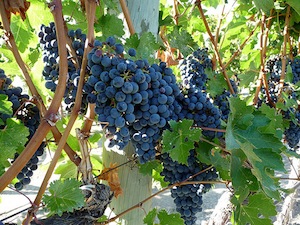
By Etty Lewensztain, Wine Expert for Menuism.com
Joe Dressner, the revered wine importer and veritable poster child for the "natural wine" movement in the United States, passed away recently. His death brought a wash of sadness over the wine world, but also incited a flurry of pointed discussions centered around natural wine -- including what that designation really means, and whether natural wines actually taste better than "un-natural" or commercially produced wines.
I'm an ardent proponent of natural wines, not because of the philosophical or environmental connotations that they carry, but because of what's in the bottle. It's as simple as that. Mr. Dressner was of the same persuasion.
Gimmicks and shticks are good for marketing, but in the end the juice in the bottle speaks louder than any sort of larger validation. So what sets natural wines apart from their commercial ,or "un-natural," counterparts. What makes them taste better -- or, shall we say -- taste more interesting?
 Image used under a Creative Commons license by Kelowna09.
Image used under a Creative Commons license by Kelowna09.For starters, natural wines are made without pesticides, herbicides, fungicides, chemical fertilizers, added sugars, artificial acids or commercial yeasts. Many natural wines are also bottled without shelf-life-prolonging sulfites and with very little or no oak at all. These are "hands-off" wines; wines that reveal their soul as directly as possible without being covered up by other stuff. These are what the wine geeks call terroir wines -- made with as little human, chemical or technological intervention as possible in order to let the land and the fruit speak for themselves. Brilliant!
So let's establish some basic definitions. Here's a look at the differences between natural, organic and biodynamic wine.
Natural Wine
Natural wines are fermented with native or wild yeasts that grow on the skins of grapes rather than commercially produced foreign yeasts, in keeping with the theory that the less you add to the wine, the better and more authentic it will taste. In addition, natural wines are typically unrefined and unfiltered. This may leave the wine a bit cloudy in appearance, and can contribute to the complexity of the wine's mouthfeel or texture. Finally, natural winemaking prohibits the use of added sugar or acids to adjust a wine's flavor profile or to correct a wine that was grown in less than optimal climatic conditions.
Organic Wine
There's a separate category of wines made with organically grown grapes that do include the use of added sulfites in the bottling process (to ensure the wine's longevity and prolong the wine's shelf life). Such wines cannot be certified organic, but often include a disclaimer on the label that states that the grapes were grown organically.
Biodynamic Wine
Biodynamic agriculture relies on the use of natural composts, mineral "preparations" and animal manure to nurture the vines, as opposed to using commercial fertilizers. Practitioners of biodynamic winemaking bury manure-filled cows' horns among the vineyards and plant the vines according to the phases of the moon, in keeping with the astronomical calendar. Pretty wild!
Despite the abundance of hippie jokes and skeptical critics, biodynamic wines are actually certified by a formal agency called Demeter International and have acquired an enthusiastic cult following in recent years, particularly among young sommeliers and other forward-thinking members of the wine trade.
But Are They Worth It?
Yes. I say this wholeheartedly. Once you've been bitten by the natural wine bug, it is extremely difficult to go back to commercially produced wines. Natural wines possess this je ne sais quoi that commercially produced wines will never have. It's a sort of added dimension that ironically results from adding close to nothing at all. Perhaps this is nature poking fun at us humans for trying to intervene and make our mark on the natural world.
Where to Find Natural Wineries & Winemakers
Italy
COS
Frank Cornelissen
Cascina Degli Ulivi
France
Thierry Puzelat/Clos du Tue Boeuf
Eric Texier
François Pinon
Spain
Bodega del Abad
Joan d'Anguera
Viña Sastre
California
Broc Cellars
Bonny Doon
Lioco
Do you drink organic or biodynamic wines? What do you think of them: well worth it or overhyped?
Related Links from Menuism:
What Makes a Wine Age-Worthy?
4 Wine Rules That Are Rubbish
9 Offbeat White Wines to Try Now
The Many Faces of a Grape: Demystifying Zinfandel
Etty Lewensztain is the owner of Plonk Wine Merchants, an online shop focused on small-production, artisanal and altogether great cheap wine. The food- and wine-obsessed Los Angeles native cut her teeth in the wine biz running a marketing campaign to promote Chilean wine in the United States, and is certified by the esteemed Wine & Spirit Education Trust (WSET) and the American Sommelier Association. Plonk Wine Merchants specializes in hidden gems from around the globe, and every bottle in the store is priced below $30. Follow Plonk Wine Merchants on Twitter @PlonkOnline.
Are Organic and Biodynamic Wines Worth It? was originally published on The Menuism Blog.